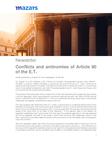
Conflicts and antinomies of Article 90 of the E.T.
On August 6, at the facilities of the “Centro de Estudios Empresariales” Ignacio Sanín Bernal -CEEISB- a seminar entitled Conflictos y antinomias del artículo 90 del E.T.; valor “comercial en operaciones sobre bienes inmuebles” (Conflicts and antinomies of article 90 of the E.T.; commercial value in real estate transactions) was held. The guest speaker was Dr. Julio César Leal Duque, who is an economist, tax analyst and tax advisor.
The purpose of the discussion was to analyze one of the most important and unexplored rules existing in the tax legislation, which was subject to a profound restructuring with Law 1943 of 2018 (last tax reform), Article 90 of the Tax Statute (E.T.). This is an important anti-abuse clause that, if not correctly interpreted and applied, could become abusive "per se".
The main problem with Article 90 of the E.T. is that, in general terms, it indicates that the price of the alienation of the goods "is the commercial value realized in money or in kind" and that "the commercial value is the one indicated by the parties, which must correspond to the average commercial price for goods of the same kind, on the date of their alienation". In the specific case of real estate, the regulation establishes that "a price lower than the cost, the cadastral appraisal or the self-appraisal will not be accepted" and that "in the cases in which there are price lists, databases, offers or any other mechanism that allows determining the commercial value of the real estate sold, the taxpayers must refer to them".
Next, the regulation states that "when the value assigned by the parties differs notoriously from the commercial value of the goods or services on the date of their sale or provision (...) the official who is carrying out the respective inspection process may reject it for tax purposes and indicate a sale price in accordance with their nature, conditions and condition of the assets, based on the statistical data produced by the General Directorate of National Taxes, by the National Department of Statistics, by the Bank of the Republic or other related entities".
Finally, it indicates that "it is understood that the value assigned by the parties differs notoriously from the current average, when it deviates by more than fifteen percent (15%) of the prices established in the trade for goods or services of the same kind and quality (...)".
According to the above, for many years the tax law has turned the auditing officer -for tax purposes- into a true evaluating authority, capable of distorting operations in which he has an interest as part of the legal-tax relationship. And therein lies the problem, as it turns out that since 2013, Law 1673 fully regulated the appraisal function in Colombia restricting those who do not hold the quality of registered appraisers to refrain from intervening in this science, under penalty of incurring in illegal exercise of the activity and in a possible crime of simulation of investiture (art. 9, Law 1673/2013). Now, this rule is not only special in matters of appraisals, but it is also special in tax matters in that it assigns to the appraiser the power to determine the taxable base in national and local taxes (art. 4 Law 1673/2013).
Similarly, in the International Financial Reporting Standards (IFRS), tax basis for determining income tax, it is established that the person indicated to determine the value of a real estate property is the appraiser.
Now, in principle, it could be said that this antinomy is solved by applying the specialty criterion established in Article 3 of Law 153 of 1887, according to which the special law prevails over the general law, especially when the special law is also later. However, it is possible that the discussion is deeper and more complex, and that it is not a simple antinomy that must be resolved by the mechanisms established by the Law, but a tacit derogation because the very existence of the cited provisions of Article 90 have become incompatible with later special provisions that fully regulated "the matter to which the previous provision referred".
For this reason, it is important for the academy to study the subject in depth, since tax audits could be being carried out based on the rules that have been tacitly repealed, which would be equivalent to a real violation of the fundamental rights of the taxpayer.


